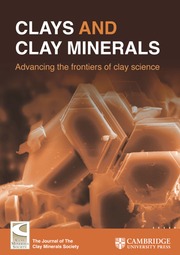Article contents
The Effect of Unequal Ionic Size on the Swelling Pressure in Clays
Published online by Cambridge University Press: 28 February 2024
Abstract
In this paper, we use the unequal radius modified Gouy-Chapman theory to evaluate the effect of the ionic size of the electrolyte on the swelling pressures (II) in different clay systems immersed in electrolytic solutions. First the model is applied to a 1:1 electrolyte to show that the coion size is only important at surface charge densities much lower than those found in typical clay systems. The swelling pressure is calculated and the results are compared with experimental data. Literature ionic radii values are used to show the dependence of the swelling pressure on the specific counterions present. Next the model is applied to a 1:1 and 2:1 electrolyte mixture with unequal-sized counterions to show the swelling pressure is highly dependent on both counterion sizes. The unequal and same-sized cases are compared.
- Type
- Research Article
- Information
- Copyright
- Copyright © 1992, The Clay Minerals Society
References
- 6
- Cited by


